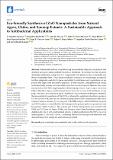Eco-Friendly Synthesis of ZnO Nanoparticles from Natural Agave, Chiku, and Soursop Extracts: A Sustainable Approach to Antibacterial Applications
Author(s)
Channa, G. Mustafa; Iturbe-Ek, Jackeline; Sustaita, Alan O.; Melo-Maximo, Dulce V.; Bhatti, Atiya; Esparza-Sanchez, Juan; Navarro-Lopez, Diego E.; Lopez-Mena, Edgar R.; Sanchez-Lopez, Angelica Lizeth; Lozano, Luis Marcelo; ... Show more Show less
Downloadcrystals-15-00470.pdf (4.267Mb)
Publisher with Creative Commons License
Publisher with Creative Commons License
Creative Commons Attribution
Terms of use
Metadata
Show full item recordAbstract
Traditional methods of synthesizing nanoparticles often rely on physical and chemical processes using synthetic hazardous chemicals. In contrast, the rise in green chemistry emphasizes using bioactive compounds from plants for the eco-friendly synthesis of nanostructures. These green synthesis techniques are increasingly recognized for their simplicity, cost-effectiveness, and ability to yield non-toxic by-products, an approach that aligns with sustainable practices. In this research, a straightforward, cheap, environmentally friendly, and sustainable procedure was developed to fabricate Zinc oxide nanoparticles (ZnO-NPs) employing three different pulp extracts: Agave (Agave americana), Chiku (Manilkara zapota), and Soursop (Annona muricata) to serve in the synthesis as capping, reduction, or stabilization agent. Analytical characterization techniques confirmed the successful phytosynthesis of ZnO-NPs, evidenced by significant absorbance peaks of UV-Vis spectra at 362 nm, and the chemical composition of ZnO without noticeable traces of phytochemical residues by carrying out ATR-FTIR analysis. SEM, STEM microscopies, and XRD analysis verified that the ZnO nanoparticles possess spherical geometries and hexagonal crystal structures. The average size of these nanoparticles was around 15.94, 18.08, and 23.32 nm for Agave, Chiku, and Soursop extract-based synthesis, respectively. Additionally, the in vitro antibacterial activity of phytosynthetized ZnO-NPs was evaluated against E. coli and S. aureus, confirming effective bacterial growth inhibition and demonstrating their significant antimicrobial potential.
Date issued
2025-05-16Department
Massachusetts Institute of Technology. Department of Mechanical EngineeringJournal
Crystals
Publisher
Multidisciplinary Digital Publishing Institute
Citation
Channa, G.M.; Iturbe-Ek, J.; Sustaita, A.O.; Melo-Maximo, D.V.; Bhatti, A.; Esparza-Sanchez, J.; Navarro-Lopez, D.E.; Lopez-Mena, E.R.; Sanchez-Lopez, A.L.; Lozano, L.M. Eco-Friendly Synthesis of ZnO Nanoparticles from Natural Agave, Chiku, and Soursop Extracts: A Sustainable Approach to Antibacterial Applications. Crystals 2025, 15, 470.
Version: Final published version